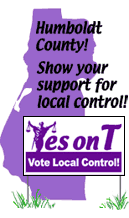Ordinance
Text
Announcements & Upcoming Events Ballot Statements & Rebuttals
Frequently Asked Questions
News Articles Archive
Public Endorsements
Voter Survey
What People Are Saying What
You Can Do to Pass Measure T
Contact Us
Home

Television Ads

Kate Christensen, owner of The Garden Gate in Arcata, supports Measure T! (30 secs)

Ray Raphael, Humboldt County Historian, supports Measure T! (30 secs)
|
News Articles
 Voters in California County May Ban Corporate Spending on Ballot Initiatives Voters in California County May Ban Corporate Spending on Ballot Initiatives
Stacy Mitchell, The Hometown Advantage Newsletter (Institute for Local
Self Reliance)
Next month voters in Humboldt County, California, will consider a
ballot measure to ban election contributions by out-of-town corporations.
Supporters of the measure contend that large corporations exert undue
influence on local political campaigns. In 1999, Wal-Mart initiated
a ballot initiative to overturn portions of the city of Eureka's zoning
laws and spent $250,000 on the campaign. In 2003, Maxxam-owned Pacific
Lumber put up $300,000 to fund a campaign to recall newly elected District
Attorney Paul Gallegos after he filed fraud charges against the company.
"Large out-of-county corporations are corrupting the integrity
of our local elections and undermining the confidence of citizens in
our government," said Kaitlin Sopoci-Belknap, who is managing
the campaign for the measure, which is sponsored by the Humboldt
Coalition for Community Rights and has won endorsement from numerous entities,
including the local Democratic Party, the Central Labor Council, many
unions, dozens of local businesses, and several elected officials.
Measure
T, also known as the Ordinance to Protect Our Rights and Local
Democracy, would bar all non-local corporations, unions, and other
organizations from contributing to political candidates and ballot
initiatives in Humboldt County.
Should it pass on June 6, the ordinance would be the first of its
kind in the country and is likely to generate widespread interest,
particularly in the many communities where corporate chains have spent
heavily to alter local zoning laws to accommodate large-scale retail
development.
Both supporters and opponents agree that it will likely face an immediate
legal challenge. At issue is a 1978 Supreme Court ruling, First
National Bank of Boston versus Bellotti, in which the court struck down a Massachusetts
statute that prohibited corporations from spending money to influence
ballot initiatives. Opponents of Measure T contend the ruling gives
corporations the same constitutional right as individuals to influence
campaigns and that right cannot be limited by a local ordinance.
(For an excellent survey of the legal terrain and a guide to citizen
activism around this issue, we recommend Reclaim Democracy's Resource
Library on Corporations and Ballot Initiatives.)
But supporters note that the Supreme Court indicated that it would
have considered arguments against corporate spending if there had been
evidence showing that they were "supported by record or legislative
findings that corporate advocacy threatened imminently to undermine
democratic processes." Massachusetts did not present such evidence.
That leaves an opening for the Supreme Court to revisit the question
of whether citizens can limit corporate political influence, say supporters
of Measure T. They constructed the ordinance language specifically
to exploit this opening. The measure asks voters to make an explicit
legislative finding that "corporate contributions in elections
are imminently undermining our democratic processes, and are denigrating
rather than protecting First Amendment interests."
Both the Wal-Mart and Maxxam initiatives provide potent local examples
of corporate influence. Although the companies lost in both cases,
the campaigns were costly for ordinary citizens to counter.
Several legal scholars have issued opinions supporting the measure's
constitutionality. "When you have a relatively small democratic
unit like Humboldt County being swamped by out-of-state corporate campaign
contributions that simply cannot be matched by the local ordinary citizens,
you have exactly the situation that the Supreme Court was seeking to
draw an exception for," said Peter Gabel, law professor at the
New College of California School of Law.
Return to News
|
Humboldt County Leaders Endorse Measure T!
Democratic Party of Humboldt County
Green Party of Humboldt County
Central Labor Council of Humboldt and Del Norte Counties
American Federation of State, County and Municipal Employees (AFSCME) Local #1684
Building and Construction Trades of Humboldt and Del Norte Counties
Carpenters Union Local #751
Operating Engineers Union Local #3 AFL-CIO
Paul Gallegos, Humboldt County District Attorney
Peter LaVallee, Eureka Mayor
Chris Kerrigan, Eureka City Council
Dave Meserve, Arcata City Council
Harmony Groves, Arcata City Council
Paul Pitino, Arcata City Council
Bob Ornelas, Former Arcata Mayor
Connie Stewart, Former Arcata Mayor
Elizabeth Conner, Former Arcata City Council
Julie Fulkerson, Former Humboldt County Board of Supervisors
... and hundreds of other individuals and local businesses! Join us today!
View the full list of public endorsements!
Learn More!

Learn more about Measure T in a Pros and Cons Video, produced by Eileen McGee (51 mins)
Radio Ads

Chris Kerrigan, Eureka City Counsel, and Kate Christensen, owner of The Garden Gate, support Measure T! (1 min)

Paul Gallegos, Humboldt County District Attorney, and Nezzie Wade, community member, support Measure T! (1 min)

Larry Glass, owner of The Works, and Dennis Rael, owner of Los Bagles, support Measure T! (1 min)
|

